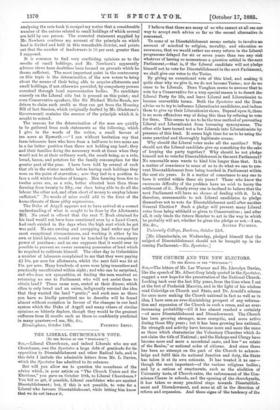THE LIBERAL CHURCHMAN'S VOTE. ET° ms EDITOR OF THE "
SPECTATOR." _1
Sra,—Liberal Churchmen, and indeed Liberals who are not Churchmen, owe the Spectator a large debt of gratitude for its opposition to Disestablishment and other Radical fads, and in this debt I include the admirable letters from Mr. L. Davies, which the Spectator has admitted to its columns.
But will you allow me to question the soundness of the advice which, in your article on "The Church Union and the Elections," you gave on October 10th, to Liberal Churchmen ? You bid us get, if possible, Liberal candidates who are against Disestablishment; but, if this is not possible, to vote for a Liberal who favours Disestablishment, while letting him know that we do not favour it.
I believe that-there are many of us who cannot at all see our way to accept such advice so far as the second alternative is concerned.
To some of us Disestablishment seems certain to involve an amount of mischief to religion, morality, and education so enormous, that we would rather see every reform in the Liberal programme delayed for six or seven years than run any risk whatever of having so momentous a question settled in the next Parliament,—that is, if the Liberal candidate will not pledge himself not to vote for Disestablishment in the next Parliament, we shall give our votes to therTories.
'By giving an exceptional vote of this kind, and making it quite clear why we -give it, we do not become 'Tories ; nor do we cease to be Liberals. Dean Vaughan -seems to assume that to vote for a Conservative for a very special reason is to desert the Liberal Party for life, and leave Liberal and Liberationist to become convertible terms. Both the Spectator and the Dean advise us to try to influence Liberationist candidates, and induce them to give up' their Liberationist views. Depend upon it, there is no more efficacious way of doing this than by refusing to.vote for them. This seems to me to be the true method of preventing Liberal and Liberationist from becoming synonymous. The other side have turned not a few Liberals into Liberationists by pressure of this kind. It seems high time for us to be using the same practical and thoroughly legitimate means.
Why should the Liberal voter make all. the sacrifice ? Why should not the Liberal candidate give up something for the sake of keeping the party together Why should he not pledge himself not to vote for Disestablishment in the next Parliament? No reasonable man wants to bind him longer than that. It is a matter of conscience to some of us to do what we can to pre- vent Disestablishment from being touched in Parliament within the next six years. Is it a matter of conscience to any one to have it settled within these six years? Those who know the enormous difficulty of the problem have no wish to hurry the settlement of it. Nearly every one is inclined to believe that the next Parliament will have no chance of dealing with it. Is it, therefore, unreasonable to ask Liberal candidates to pledge themselves not to votefor Disestablishment until after another General Election ? Such a pledge will prevent many Liberal votes from being withheld or given to Conservatives ; and after all, it only binds the future Member to act in the way in which he probably will act, whether he gives the pledge or not—I am,
[Mr. Chamberlain, on Wednesday, pledged himself that the- subject of Disestablishment should not be brought up in the coming Parliament —En. Spectator.]


































 Previous page
Previous page